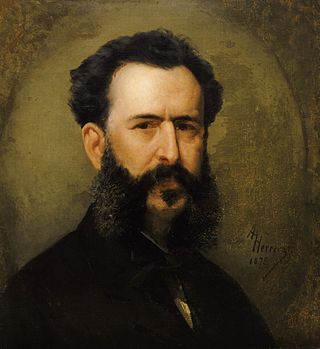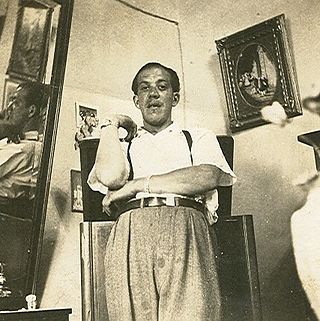
The "Argentine National Anthem" was adopted as the sole official song of Argentina on 11 May 1813—three years after the May Revolution. Its lyrics were written by the Buenos Aires-born politician Vicente López y Planes and the music was composed by the Spanish musician Blas Parera.

Antonio Leocadio Guzmán Blanco was a Venezuelan military leader, statesman, diplomat and politician. He was the president of Venezuela for three separate terms, from 1870 until 1877, from 1879 until 1884, and from 1886 until 1887 and General during the Venezuelan Federal War.

Eduardo Marturet is a Venezuelan conductor and composer represented by Tempo Primo. He is the Music Director and Conductor of The Miami Symphony Orchestra (MISO).

Martín Tovar y Tovar was a Venezuelan painter, best known for his portraits and historical scenes.
Venezuelan literature is the literature written by Venezuelans or in Venezuela, ranging from indigenous pre-Hispanic myths to oral or written works in Spanish or other languages. The origins of Venezuelan written literature are usually held to date back to the documents written by the first Spanish colonizers, its date of birth being sometimes set at August 31, 1498, when Christopher Columbus called the Venezuelan territory in his Diaries "Tierra de gracia".

Victor Guillermo Ramos Rangel was a Venezuelan classical musician.

The National Pantheon of Venezuela is a final resting place for national heroes. The Pantheon was created in the 1870s on the site of the ruined Santísima Trinidad church from 1744 on the northern edge of the old town of Caracas, Venezuela.

Maria Guinand is an internationally renowned choral conductor.
Vicente Salias was a Venezuelan medical doctor, journalist, and writer who wrote Venezuela's "Gloria al Bravo Pueblo" "Glory to the Brave People." national anthem. Born in Puerto Cabello, Carabobo on March 23, 1776.
Schola Cantorum de Venezuela is one of the most important choral societies belonging to the growing choral movement in Venezuela. The SCV began in 1967. Its founding members included composer Alberto Grau, a Venezuelan composer and conductor born in 1937 in Barcelona, Spain; and Venezuelan composer Ana Rugeles among others. Currently, the choir is conducted by María Guinand and Ana María Raga, with the assistance of young conductors Pablo Morales Daal and Victor Leonardo Gonzalez. Schola Cantorum de Venezuela works under the sponsorship of the Fundación Schola Cantorum de Venezuela, a Non-Profit Organization that oversees several other choirs such as: Cantoría Alberto Grau, Pequeños Cantores de la Schola and Schola Juvenil. Together they provide a complete system to promote and develop choral music in Venezuela.

Guillermo Tell Villegas Pulido, was a Venezuelan lawyer, writer, journalist, and politician who served as acting president of Venezuela. A lawyer early in his career, in 1876 he cofounded the school La Paz in Caracas. Also dedicated to journalism, he founded the publications Alianza Literaria in 1876, La Mayoría in 1879, and Monitor in 1889. Between 1879 and 1892 he held various political roles including Secretary of Interior of the Federal District, secretary general in the government of President Antonio Guzmán Blanco, and a trial judge in Caracas.
Juan José Landaeta was a Venezuelan composer.

The United States of Venezuela was the official name of Venezuela, adopted in its 1864 constitution under the Juan Crisóstomo Falcón government. This remained the official name until 1953, when the constitution of that year renamed it the Republic of Venezuela. In 1999 under newly elected president Hugo Chávez and his modification to the Constitution, Venezuela's official name became the Bolivarian Republic of Venezuela.

Barbarito Díez was a Cuban singer who specialized in danzón. He began his career as the singer for Graciano Gómez and Isaac Oviedo's son group, before joining Antonio María Romeu's orchestra. As the lead vocalist for Romeu's ensemble for 20 years, he established himself as one of the main exponents of the sung danzón. He continued singing with his own charanga, as well as other groups, for another 30 years. He also toured and recorded in Venezuela and Puerto Rico before retiring in the early 1990s, when complications from diabetes prevented him from performing and eventually resulted in his death in 1995. A naturally-gifted tenor, he was known for his sense of rhythm, correct diction and romantic style.
Independence Day, also known as the Fifth of July is the national independence holiday of Venezuela, marked every year on July 5 which celebrates the anniversary since the enactment of the 1811 Venezuelan Declaration of Independence, making the country the first Spanish colony in South America to declare independence. In recent years, it is also marked as National Armed Forces Day to honor the faithful service of all the serving men and women and veterans of the National Bolivarian Armed Forces of Venezuela.

The Sabana Grande district is divided into several middle class neighborhoods located in the Parroquia El Recreo of the Libertador Municipality, in the geographical center of the Metropolitan District of Caracas. It owes its name to the old town of Sabana Grande.

The Ministry of Economy and Finance is a ministry of the government of Venezuela with similar portfolios dating back to 1810 with the creation of a tax office. When Gran Colombia was dissolved and Venezuela assumed its independence, the Ministry of Finance was created in 1830 when General José Antonio Páez commissioned the establishment of the public business office to three Secretariats of State: Interior, Justice and Police, War and Navy, Finance, and Foreign Relations. The current minister has been Delcy Rodríguez since September 2020.

The Constitution of Venezuela of 1881 was sanctioned by the Congress on April 4, 1881 and promulgated by Antonio Guzmán Blanco on April 27 of the same year. It reduced the 20 states of the Federation to 9 and created the Great Federal Council, in charge of electing the President. The National Congress appointed the members of this council every 4 years, composed of one from each state; and the council appointed the president from its own body every two years, declared the song "Gloria al Bravo Pueblo" as the national anthem, created the Ministry of Public Instruction, and recognized the Court of Cassation as the Supreme Court of the States.













